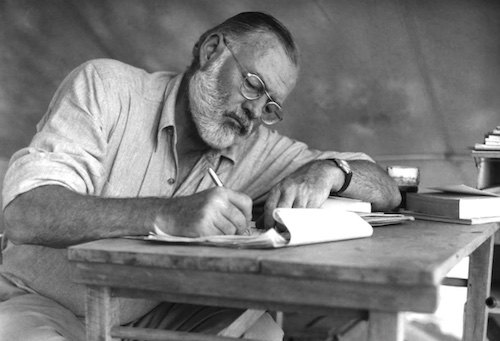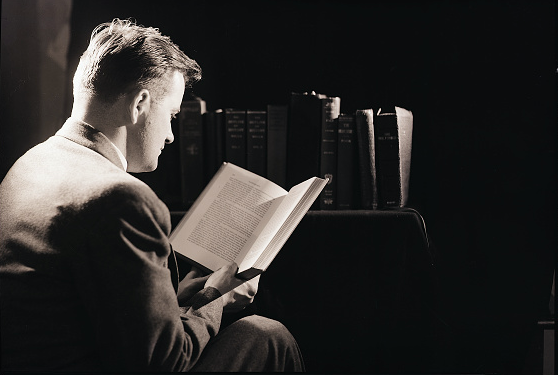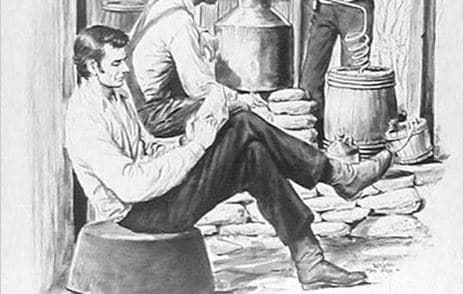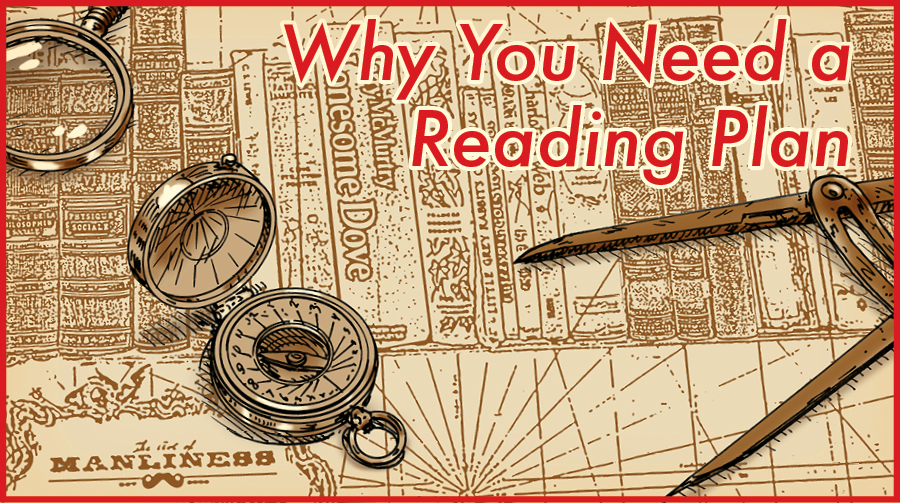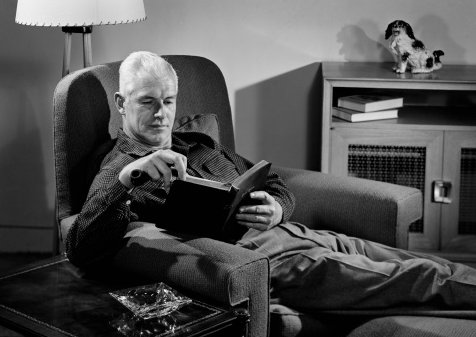
At the Art of Manliness, we encourage our readers to read books. It’s through reading that we gain new perspectives and learn more about ourselves and the world around us. I’m a big believer in the saying that “Readers are leaders.” As I’ve studied the lives of great men throughout history, a common thread I’ve found is that most were bibliophiles who relentlessly pursued self-education throughout their entire lives.
While many men have stacks of books accumulating on their “to-read” pile, chances are that pile is composed primarily of non-fiction tomes. For the past 20 years or so, the publishing industry has noted a precipitous decline in the number of men reading fiction. Some reports show that men make up only 20% of fiction readers in America today.
There are a lot of reasons thrown around as to why many men today don’t read fiction. Perhaps they had a bad experience with it in high school and swore they’d never read a novel again as long as they lived. It’s possible that the male brain is just naturally more drawn to the straightforward, fact-driven nature of non-fiction. And some have suggested that men are getting their storytelling fix from the many excellent narrative non-fiction books that have come out in the past few decades (e.g., The Rise of Theodore Roosevelt, Into Thin Air).
Whatever the reason, cognitive studies are beginning to show that men might be short-shrifting themselves by avoiding the fiction section in the bookstore and library. Today we make the case for why you need to put down those business books every once in awhile and pick up a copy of Hemingway.
Why Men Should Read More Fiction
In the past decade, several cognitive scientists have turned their attention to how fiction affects our minds. Leading this research is cognitive psychologist and fiction writer, Dr. Keith Oatley. Dr. Oatley and other researchers from around the globe have discovered that fiction not only activates, but also improves the cognitive functions that allow us to thrive socially.
Dr. Oatley argues in his book Such Stuff as Dreams: The Psychology of Fiction that fiction is primarily about “selves in a social world,” and that fiction’s main subject is “what people are up to with each other.” Just as your understanding of history and finance is improved by reading lots of books on those subjects, reading fiction improves your understanding of social relationships — your thinking about what other people are thinking. In fact, Dr. Oatley calls fiction a simulation for the social world that allows you to experience (at least vicariously) a variety of social circumstances with different kinds of people than you might encounter in your actual day-to-day life.
Most of your success as a man, whether in love or work, depends on your ability to socialize adroitly. We’ve all heard the phrase, “Success depends not on what you know, but who you know.” As much as you’d like to think that’s not true, it is. You can be the most skilled and talented whatever in the world, but you’ll likely labor away in obscurity if you don’t know how to reach out and share those talents with others.
Unfortunately, men have gotten the short end of the evolutionary stick when it comes to our ability to socialize. Studies show that male brains are generally wired for dealing with stuff, while female brains are generally wired for dealing with people. This may explain why women often prefer fiction over non-fiction: their brains are already wired to want to read about “selves in a social world.”
Thus as men, we probably have the most to gain from reading fiction. Instead of seeing fiction as a bunch of made-up, waste-of-time baloney, look it as a simulator that allows you to exercise and strengthen the cognitive muscles responsible for socializing. Every time you pick up and read a novel, you’re molding yourself into a better, more socially adept man.
Below we flesh out what the research says about how exactly fiction improves our minds.
1. Reading Fiction Strengthens Your Theory of Mind
Theory of mind is a cognitive ability that humans use all the time, but take for granted. Basically, it’s our ability to attribute mental states (like thoughts, feelings, and beliefs) to others based on a whole host of input in order to predict and explain what they are thinking. Cognitive scientists call this ability “theory of mind” because when we interact with others, it’s impossible for us to know exactly what they’re thinking/feeling/perceiving, so we have to construct a theory of what they’re thinking/feeling/perceiving in their mind. Without theory of mind, social interaction would be awkward, clumsy, and nearly impossible.
Some examples of theory of mind in action:
- We use theory of mind when we see a smiling huckster and think, “Sure, he’s smiling, but I think he’s actually trying to screw me here.” You see the smile, but you’re attributing an alternative mental state because of some other information you know about the guy.
- Theory of mind pervades romantic relationships. “I think she thinks that I like her, but I really don’t. How do I let this girl down easily?” In this case, you are theorizing that a young lady has a thing for you, and that she thinks the feeling is mutual even though it isn’t. Now you have to figure out how to handle this situation.
- We use theory of mind to strategize and deceive. The famous poisoned goblet scene in The Princess Bride is a perfect example of theory of mind in action:
Theory of mind isn’t something that we’re born knowing how to do. Children start developing theory of mind around three or four years old. Until then, infants and toddlers think that whatever they’re thinking/feeling/perceiving, is what others are thinking/feeling/perceiving too. It’s why my 18 month old son Gus “hides” by simply covering his eyes with his hands. He thinks because he can’t see me, I can’t see him, even though he’s sitting right in front of me in his high chair. While certainly cute, it’s a big theory of mind fail.
Generally, girls develop theory of mind before boys do and teenage girls tend to do better than teenage boys on theory of mind tasks. The female advantage in theory of mind also extends into adulthood. Women’s superior theory of mind ability is probably a result of both evolutionary and sociological factors. Cognitive scientist Simon Baron-Cohen (He’s Borat’s cousin. Seriously!), postulates that autism affects men more often than women because those with autism have an “extreme male mind.” Those with autism often lack or have an underdeveloped theory of mind, which explains why they frequently struggle to interact socially–they lack the ability to read other people.
So what does theory of mind have to do with fiction? Well, studies show that when we read fiction, the parts of our brain responsible for theory of mind light up and are heavily engaged. Narratives require us to guess at the hidden motives of characters, figure out what their enemies or lovers may or may not be thinking (when the author doesn’t tell us explicitly), as well as keep track of all the social interactions between characters. Ernest Hemingway was famous for forcing his readers to guess the mental state of his characters by substituting words with actions. For example, at the super-sad end of A Farewell to Arms (don’t read it if you’re a father-to-be; trust me.), the main character, Frederic Henry, doesn’t say anything at all — he just walks back to his hotel in the rain. End story.
Mystery novels particularly exercise our theory of mind ability. Whenever you read a Dashiell Hammett novel, you’re guessing right along with Sam Spade about what the subtle gestures or the words spoken by all the characters really mean. Is the suspect or witness just saying something to throw you and Spade off the trail? Juggling all this mind-reading is both fun and taxing, which is why literary critic Lisa Zunshine says the mental workout you get from reading a detective story is a lot like lifting weights at the gym.
While reading fiction may engage our theory of mind, does it strengthen it? In recent studies by Dr. Oatley, the answer appears to be yes. In studies published in 2006 and 2009, Dr. Oatley reports that individuals who frequently read fiction perform better on theory of mind tests, regardless of gender. One such theory of mind test is the Mind’s Eye Test in which participants look at photos of nothing but people’s eyes and then have to describe what the people are feeling. Fiction readers perform better at this test than non-fiction readers. And a 2010 study performed on pre-school children showed that the more stories that were read to them as toddlers, the stronger their theory of mind. (Read to your kids, dads!)
2. Reading Fiction Makes You More Empathetic
In order to be empathetic, it’s not enough to figure out what someone is feeling (which theory of mind can aid in); empathy requires us to have the same emotional reaction as the other individual.
Just as with theory of mind, men are generally less empathetic than women. While we tend to think of empathy as more of a feminine trait, it’s essential for both genders to develop empathy because it’s the glue that holds civilized society together and allows us to have strong, long-lasting relationships with our friends and lovers.
Unfortunately, as we highlighted in our article Our Disembodied Selves and the Decline of Empathy, empathy has been declining among both men and women in the past few decades, and online communication has been a driving force behind the decline. While we encouraged readers to counteract the empathy-sucking power of online communication by balancing it with more face-to-face conversations, studies show that curling up by yourself with a good novel can help increase empathy as well.
In 2008, Dr. Oatley tested whether reading fiction makes us more empathetic. He gave 166 participants either the Chekhov short story, “The Lady with the Little Dog,” or a version of the same story rewritten in documentary form. The subjects’ personality traits and emotions were assessed before and after reading. While readers of the boring documentary version showed no changes in empathy or attachment to the characters, those who read the original Chekhov story showed an increase in empathy towards the characters. Similar studies done by the University of Buffalo show the same thing. Dr. Oatley concedes that the changes could be only temporary, but hypothesizes that repeated fiction reading may have more lasting effects on empathy.
3. Reading Fiction Increases Creativity
Cognitive scientists believe that fiction originates in play. Just as children engage with make-believe and imaginative worlds, so too do adults when they read a story. And just as open-ended play develops a child’s ability to conceive and evaluate alternatives, a well-written piece of fiction does the same for grown-ups. Reading fiction can boost our creativity by exposing us to fanciful ideas and narratives that we otherwise wouldn’t experience reading non-fiction.
But perhaps fiction’s greatest creativity boost is what literary critic Viktor Shklovsky said is the purpose of fiction: to make the familiar strange, so that we look at things in a new light. Fiction allows us to compare how the human experience and ideas work in a made-up world to how they work in real life. From these comparisons, we can begin to think about ideas in profoundly different ways. I like to think that fiction disorients us to reorient us and during that reorientation new ideas spring to our minds.
What Kind of Fiction Should I Read?
In a telephone interview, I asked Dr. Oatley if there’s any type of fiction that men should be reading in particular. His response was to read whatever interests you, whether it’s highbrow Russian novels or lowbrow dime paperbacks. “Our studies show that the effect fiction has on the mind is independent of literary quality,” says Dr. Oatley. He actually encourages folks to read a wide variety of fiction so that “they get to know more people in more circumstances.” So go ahead. Read those Louis L’Amour and Michael Crichton novels without any guilt. You’re helping yourself become a charismatic social-dynamo.
As we mentioned earlier, mystery novels may especially exercise our theory of mind because they require us to guess the secret intents of a catalog of suspects based on subtle clues left by the author. So boning up on your Hammett, Chandler, and Christie could possibly be beneficial and will definitely be enjoyable.
And while Jane Austen’s novels are often considered anathema to men, they also do a good job working your theory of mind. Keeping up with who has a thing for who and what all those subtle Victorian gestures really mean will leave your brain hurting, but stronger in the social skills department.
Dr. Oatley did suggest two books that he recently read that he thought men might enjoy: Netherland and The Reluctant Fundamentalist.
Bottom line: make sure to mix in some fiction reading with your non-fiction selections. It will make you a better, more successful man.
To get some ideas for some male-oriented fiction to check out, see the following resources:
BULL Men’s Fiction (great site and magazine dedicated to men’s fiction)


